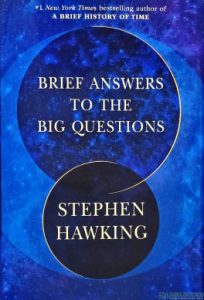Books / Discernment / Pluralistic World
Brief Answers to the Big Questions (Stephen Hawking, 2018)

The Reason for No God
My first thought upon picking up Stephen Hawking’s 2018 book, Brief Answers to the Big Questions is that it is the Naturalist’s equivalent of Tim Keller’s The Reason for God (2008). In winsome, thoughtful terms a layman can understand, the famed scientist and mathematician provides his answers to ten questions:
Is there a God?
How did it all begin?
Is there other intelligent life in the universe?
Can we predict the future?
What is inside a black hole?
Is time travel possible?
Will we survive on Earth?
Should we colonise space?
Will artificial intelligence outsmart us?
How do we shape the future?
Stephen Hawking (1942-2018) requires no introduction. His life story is well known, his discoveries and scientific theorizing well publicized and his wide appeal as a public intellectual undiminished. “People have always wanted answers to the big questions,” Hawking says. “Where did we come from? How did the universe begin? What is the meaning and design behind it all? Is there anyone out there?” As a Christian I certainly agree. It’s what St Augustine was referring to, I think, when he spoke in his Confessionsof our “restless hearts.” We can suppress the search, of course, or be so distracted as to ignore the questions for a while, but they remain and occasionally—at points of crisis and uncertainty, for example—they literally demand our attention.
“The creation accounts of the past,” Hawking continues, “now seem less relevant and credible.” I disagree, though popular (per)versions of them have rightly revealed themselves to be neither credible or plausible. “They have been replaced by a variety of what can only be called superstitions, ranging from New Age to Star Trek. But real science can be far stranger than science fiction, and much more satisfying.” Again, I agree. Unsurprisingly, Hawking’s answers to the big questions are based on the conclusions and assumptions of modern science, which for many today is seen as the only possible source of ultimate knowledge for life and reality.
Brief Answers to the Big Questions begs to be read and discussed. Please do so—and be certain to include friends who will find Hawking’s Naturalism to be credible.
As you read and discuss this book, there are some questions that will be worth some serious reflection. Why this particular list of questions? Many religious believers would probably identify a slightly different set of The Big Questions. The specific questions we pose are related to where we stand when we ask them, and to the sort of answers we expect to find. What is attractive in how Hawking answers the questions? Hawking’s prose is markedly different from the aggressive secular fundamentalism of Richard Dawkins or the late Christopher Hitchens. He comes across as reasonable and authentic, and the difference matters. What unacknowledged assumptions and beliefs does Hawking accept without disclosing the nature of his faith?We all, Christian and Naturalist alike begin by faith. I accept by faith, for example, that God exists; Hawking accepts by faith the accurate working of our senses on an external reality that truly exists. In the end we are all believers. In what ways do the Christian answers to the Big Questions intersect—agreeing and disagreeing—with Hawking’s ideas? Our non-Christian neighbors and colleagues may not be as eloquent in talking about their view of things as Hawking, but many will agree with him. It is our calling to relate the biblical understanding of life and reality in love, and in terms our friends can understand, even if they choose to disbelieve it.
Use Hawking’s book as an exercise in discernment and apologetics. This is the worldview that animates the mind, heart and imagination of an increasing number of our neighbors and friends. We need to be able to provide good and sufficient reasons for what we believe and why. And parents and youth pastors should consider using this book as a text with young adults.
I recommend Brief Answers to the Big Questions to you.
Book recommended: Brief Answers to the Big Questions by Stephen Hawking (New York, NY: Bantam Books; 2018) 211 pages + index

